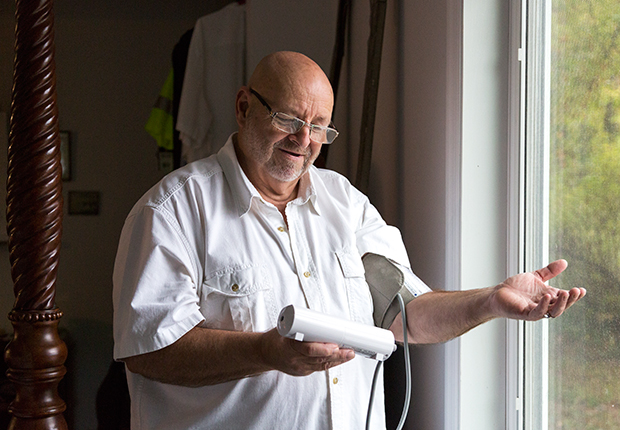AARP Hearing Center

By Cristina Rouvalis
When Alan Ward, 65, had a massive heart attack in May, he was rushed from his doctor’s office in rural Pennsylvania to UPMC Passavant Hospital outside Pittsburgh for emergency surgery. Blockages had closed 99 percent of an artery, but he has made a strong recovery, thanks in part to the follow-up care.
Ward, a retired baker and photographer, checks in with his medical team every morning—without ever leaving his home in Valencia.
Using a touch-screen tablet, he enters his weight, blood pressure, oxygen level and other data so the nurses and doctors can monitor his progress and detect potential problems. He can contact the medical staff at any time using the same tablet, on loan from UPMC.
“It’s awesome,” said Ward, who lives a half-hour drive from the hospital. “It’s instantaneous. My oxygen was low one day and the nurse called me within 10 minutes. I have never felt better. You don’t have to get out of your pajamas.”
Ward is an enthusiastic participant in telemedicine, a growing trend that allows for the remote delivery of health care through telecommunications technology. The UPMC program also includes videoconference calls between cardiac patients and their doctors.
When the General Assembly meets next month, AARP Pennsylvania will support several bills that promote telemedicine, noting that older people and their family caregivers would benefit more from access to specialized health care without long-distance drives.
“People in rural areas could have a FaceTime call, instead of driving hours to get to a specialist,” said Ray Landis, advocacy manager of AARP Pennsylvania.
According to the American Telemedicine Association (ATA), there are about 200 telemedicine networks in the United States. Nearly 1 million Americans use remote cardiac monitors, and others use telemedicine for radiology, pathology and other medical services.
Saving time and travel
“With videoconferencing, a picture is worth a thousand words,” said Andrew Watson, M.D., vice president of UPMC International and the ATA. “You get a sense of the person’s environment and whether they’re sick. It also saves these patients hours of driving. If a patient isn’t feeling well or feels nauseous, the last thing they want to do is get into the car.”
One bill AARP is studying, drafted by Rep. Marguerite Quinn (R-Doylestown), would forbid insurers from excluding coverage solely because care is delivered through telemedicine.
Bringing the option of telemedicine to even more patients, a major AARP goal, got a boost late in the 2016 session. The General Assembly unanimously passed a bill sponsored by Rep. Jesse Topper (R-Bedford) that will allow doctors to practice telemedicine across state borders.
“We have great hospitals in Pennsylvania that could work with patients in other states. And our patients could go to specialists in other states,” Landis said.
Other initiatives to help older people stay in their homes include:
- A bill introduced by Sen. John Yudichak (D-Plymouth Township), under which residents could receive tax credits of up to $2,000 to install accessibility features in a new residence or a 50 percent subsidy, up to $2,000, in an existing structure. “This allows people to stay in their homes with repairs such as a ramp or even something as simple as changing the door knobs,” Landis said.
- AARP’s efforts to spread the word about the Caregiver Advise, Record, Enable (CARE) Act, going into effect in April. It requires hospitals to give caregivers instructions for duties such as wound care and injections upon a patient’s discharge.
Keep track of legislative activity at aarp.org/pa.
Cristina Rouvalis is a writer living in Pittsburgh.































































